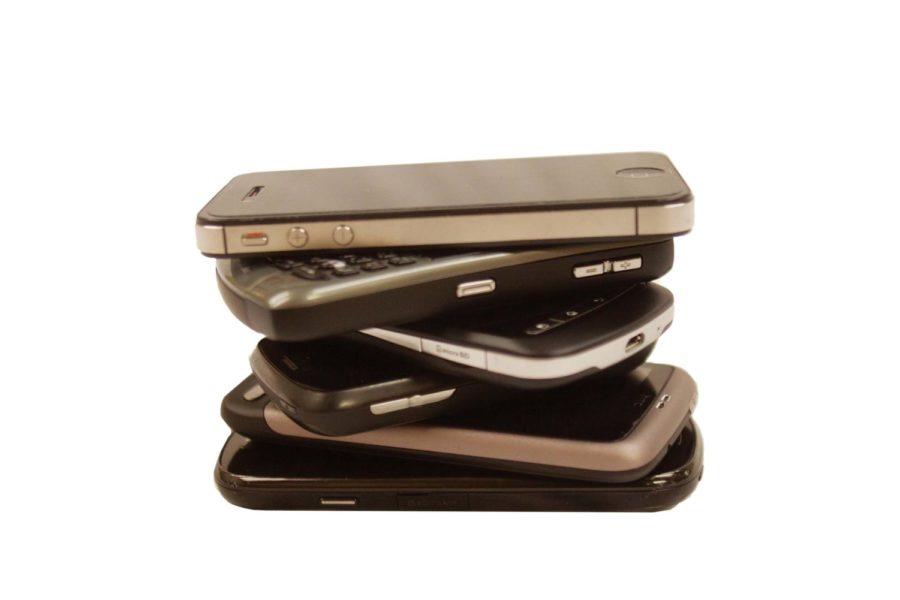Verhasselt: The smartphone war has only just begun
Photo illustration: Kelsey Kremer/Iowa State Daily
Cellphone Stack
September 6, 2011
An era in consumer technology truly ended two weeks ago when Steve Jobs stepped down as CEO of Apple Inc. Of course this was for medical reasons and we all wish Jobs and his family the best. His departure, however, was at a crucial time for Apple and its smartphone division. Tim Cook, the new CEO, has quite the shoes to fill, and as the new leader of Apple Inc., he has quite the war waging at his hands.
As I light a cigar and get comfortable in my chair, I ask that you hear me out as I tell you the tale of a battle between two opposing factions that will fight until the bitter end to claim victory over the other and dominate the world, or in this case, the world smartphone market. Like Columbus conquering the Americas for Spain, this year’s iPhone delay has allowed for Google’s Android armada of phones to steal more of Apple’s and RIM’s (BlackBerry) market share. Not to mention Google’s recent acquisition of Motorola Mobility, which allows for unlimited possibilities in terms of the “Ultimate Google Smartphone.”
So now, not only does Google have a diverse list of handsets consisting of LG, Samsung, HTC, Motorola, Sony and more, it also has its presence on almost every U.S. cellphone carrier. You can even purchase decent Android handsets on prepaid phone plans, allowing for an even broader user base.
So what do you do if you’re Apple? Your ship is outdated. Once the great innovators of the smartphone market, they now find themselves in Google’s arena. Apple literally has had to change its strategy from being the innovator to playing a game of catch-up in this arms race featuring Android dual-core smartphones that almost all have 4G and an insane amount of apps under development. Not to mention Google’s next “Ice Cream Sandwich” update that Google intends to launch alongside the iPhone 5.
In all arms races, espionage and speculation are all the rage, and the same is happening here. The iPhone 5 rumor mill is running at full capacity and has dominated the news this last week. Here’s what we know so far:
– Rumors from the past months all cite an iPhone 5 with a dual-core processor, a better camera — capable of capturing 1080p video — and a larger display that almost eliminates the phone bezel entirely.
More recently however, the following rumors have been circulating with several grains of salt attached:
– The next iPhone will be on all the major carriers. That means in addition to Verizon and AT&T, the iPhone will be coming to T-Mobile, which is to be expected as AT&T is in the process of purchasing all of T-Mobile. More importantly, however, the iPhone will be on Sprint, which is something that would have been inconceivable at this time last year.
– The new iPhone will be a world phone, capable of GSM and CDMA as well as 4G and LTE.
– iOS5 will be on the next iPhone. The iOS operating system is clearly dated when compared to Android’s 2.3 Gingerbread. The iOS5 update brings iOS devices a better notification system, Twitter built in and iMessage, which combines SMS messages and an iOS-only messaging platform. These and other features are planned to bring iOS “up to spec” in terms of 2011 smartphone standards.
– And now for the gem of the rumors. Since the initial launch of the first iPhone, there have always been rumors of an iPhone Nano or something similar in the works. This may finally come to fruition with more and more rumors and sightings of an iPhone 4GS, which opens up the floodgates in terms of device and plan pricing, as well as availability.
The question remains, however, will this be enough? This handset rearmament by Apple comes right as Samsung has launched the predecessor to its best-selling handset: the Samsung Galaxy S — the Samsung Galaxy S II — which features 4G, a 1.2ghz dual-core processor and a similar camera and display to what the iPhone 5 would have. And that’s just the release of one phone by Samsung. Other manufacturers are also gearing up for this holiday season where consumer demand separates the victors from the vapor-ware, and the Q4 profits from corporate divestiture.
What will happen? I personally think availability on more carriers will give Apple the bump it needs to get more handsets in more consumer’s hands. However, it’s a catch-22 as more carriers would no longer give the iPhone its exclusive, elitest social status, making it more of an “everyone has one Motorla RAZR” instead.
It’s also increasingly hard to resist the beautiful handsets coming out on the Android platform. And if you’re still on the fence, avoid the trend entirely and check out Microsoft’s Windows Phone 7 devices; they could sure use the business.







